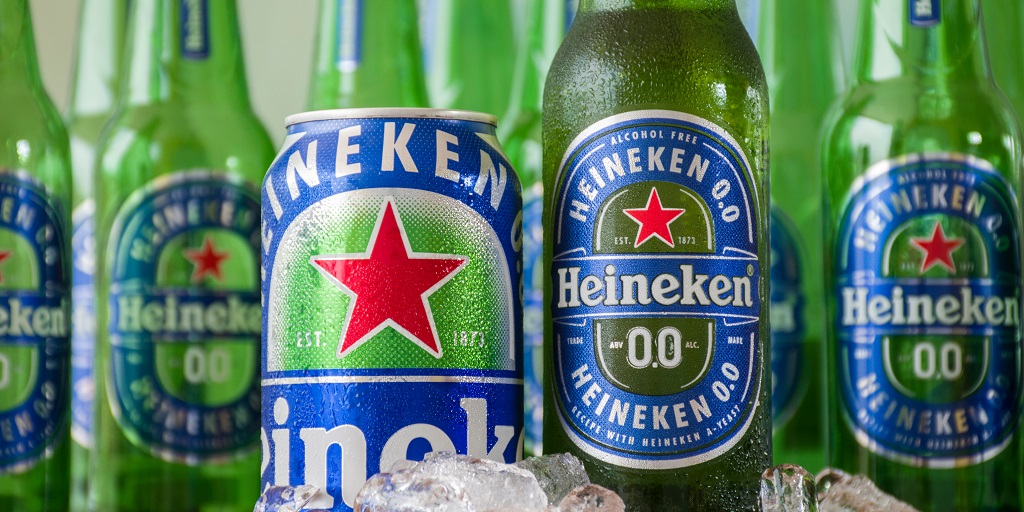
Double digit growth for Heineken 0.0

The double-digit global growth of Heineken’s alcohol-free offering has offered the global brewer a reprieve after a decline in volumes over the COVID period.
Heineken 0.0 grew double digits with a particularly strong performance in Brazil, Mexico and the USA, and it was introduced to 11 new markets including Vietnam, the Heineken parent company said.
According to Heineken’s third-quarter results announced yesterday, the company’s beer volumes declined 2.1 per cent in the quarter, and 8.3 per cent over the first nine months of its financial year.
In Asia Pacific, the company’s volume across all products declined 12.3 per cent to 6.6 million hL for the quarter. Sales of the Heineken brand itself however grew to 1.8 million hL, an increase of 15.4 per cent in the quarter.
“Our performance during the third quarter continued to be impacted by the COVID-19 crisis,” said CEO Dolf van den Brink.
“As many lockdowns eased, our volumes improved sequentially compared to the last quarter.
“The situation remains highly volatile and uncertain. We expect rolling outbreaks of COVI-19 to continue to meaningfully impact many of our markets in addition to rising recessionary pressures,” he said.
According to analysts at data company GlobalData, Heineken reported a better recovery than expected.
“The closure of on-trade channels obviously had a profoundly negative effect on Heineken’s sales, but, interestingly, there was still double-digit growth in the company’s alcohol-free brand – likely due to reduced on-trade occasions and concerns over health factors associated with the pandemic,” said Ryan Whittaker, consumer analyst at GlobalData.
“Alcohol-free and low-ABV beers are expected to do well during the pandemic, and Heineken 0.0’s sales results in Brazil, Mexico and the US suggest that this is the case.
“The alcohol-free beer category is one of the beer industry’s most innovative in recent years.
“One of the reasons for this is that it is seen as healthier, and health has been brought to the front of people’s minds during the pandemic.
“Given that the [millennial] age group is so health-conscious, it seems likely that low-calorie, non-alcoholic beers can be expected to do well in the autumn and winter period, as we approach Christmas.”
The results coincided with the news yesterday that Heineken successfully bid for Asahi Beverages Stella Artois and Becks brands, which had been put up for sale as a condition of Asahi’s $16 billion deal for Carlton & United Breweries.
The divestment of the brands was court-enforceable, and as part of the undertaking, it also required Asahi to ensure the divested brands receive the same access to bars, pubs and clubs as well as off-premise space under “tap-tying agreements” until June 2023.
“The acquisition brings the Strongbow brand in Australia home to Heineken and scales up our beer and cider portfolio in one of the world’s leading beer and cider markets,” it said.
The Strongbow Cider in particular marks a milestone, as the acquisition will mean the brand returns to the global Strongbow portfolio after 17 years in the hands of other players, Heineken said.
Lower and no-alcohol beers are one of the fastest moving industry segments with brewers across the size spectrum looking to add one to their range. If you would like to learn more about the segment, and production techniques and the potential problems and pitfalls to avoid, join Brews News and our presenting partners Fermentis for a free live webinar covering all aspects of production.
Presenters Jon Seltin (Brick Lane), Philippe Jannsens (Technical Manager Brewer, Fermentis) and Ruth Leary (Regional Sales Manager, Fermentis).
When:
Wednesday, 2 December
Brisbane (AEST) 2pm
Sydney/Melbourne (AEDT) 3pm
Adelaide (ACDT): 2.30pm
Perth (AWST): 12.00 noon



